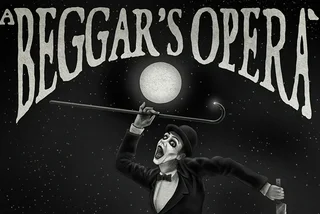The Prague adaptation of the classic play A Beggar’s Opera is back on stage with a cast of talented local actors playing Soho’s dark underbelly. Inspired by the 18th-century English dramatist John Gay, the text blends with the music of British trio The Tiger Lillies, performed live by the Divadlo Miloco ensemble. The resulting show packs a modern punch with cabaret and punk influences for a timeless and humorous feel.
Director Daniel Brown said that the structure is one aspect that makes the play, which had a successful debut in June, unique. An “ensemble-driven piece,” it was crafted by himself, the actors, and the musicians, and came together thanks to dramaturge Colm McCarthy, who “did a magnificent job, adapting the original John Gay script.”
Additionally, the live music is interwoven into the fabric of the show, Brown says, adding “Everything is coming live from the stage and all the performers or all the musicians are also performing throughout the show.”

The play, Brown says, blends different genres into a piece that the ensemble made their own “rather than clashing genres or deliberately clashing styles or periods.” The result “is kind of out of time and also timeless. There is a feeling that it's a period piece, but you wouldn't be able to say what period.”
The charm of John Gay's music, Brown says, is that Gay used “street ballads and songs that were popular at the time, street songs and a lot of very provocative satirical material and political satire.” Adding a punk touch is the music from the Tiger Lillies, with Brown pointing out the luck of getting permission to use it in the show, and to have “incredible musicians performing it.”
Gay’s play had been reworked several times over the years, the best-known version being the Three Penny Opera by German playwright Bertolt Brecht, with music by German-American composer Kurt Weill.

McCarthy says that the show’s producers initially intended to use the Brecht script with only minor adaptations “in order for us to fit in the Tiger Lillies music in place of the Kurt Weill music. But then we realized we couldn't use the Bertolt Brecht script, so we had to write a new script.”
As such, even though the play is inspired by John Gay and Brecht, “it's also something completely original,” according to McCarthy.
Another change that gives the play a more contemporary feel is its length, McCarthy says, which is down to 85 minutes from the two-hour-long Gay original. “I wrote the text to sew the songs together. We had the songs by the Tiger Lillies, and I created the text and our plot to link the songs together, while still telling the soul of the story,” with jokes sprinkled throughout the text to make the audience laugh.
The story at the core of the play is a love triangle between highwayman Macheath, his fence's daughter Polly and the jailer's daughter Lucy.

Speaking about the first run of the show, Michael Pitthan, who plays Mr. Peachum, the main antagonist, said that people were “very surprised and happily, pleasantly surprised with how horrible and vile the show was” as well as enjoyable. Lindsay Taylor, who plays his on-stage wife Mrs. Peachum, added that the show offers a chance to “laugh at the whole ridiculousness of corruption” and that it “felt good to have a space and a project to be able to do that in a pseudo safe way.”
Beyond the laughter, Pitthan says that the play had a deeper message, as it invites audiences to think whether anything “changed since the 18th century in terms of poverty and how that's inflicted upon people and held up by the establishment.” Taylor echoes the view, saying the play’s message is that, if “you can get a hold of power and you can use it against somebody else to elevate yourself, to help you climb the ladder, do that.“
To sum it up, what sets the play apart from other premieres happening this fall is, according to Pitthan, the unique combination of a “very physical show” and actors that are part of a musical ensemble, which are not common in Prague, even on the Czech scene. It’s the music, Pitthan says, that “really drives the story along and allows the audience a moment of respite from the absolutely horrific individuals on stage.”

Accordionist Jirka Čevela, who is interpreting one of the thieves, says that the show has come a long way since its June premiere. One of the reasons is the good vibe at the rehearsals, which translated into the on-stage chemistry, and “things written between the lines” that made the play come together in a more organic way.
Marc Dexter Cram, who plays the main character Macheath “Mack the Knife” also praised the cohesiveness of the current version, which also evolved thanks to countless late-night talks between cast members, adding “Everyone in the cast had a solid idea of what it was going to be, coming into it, but it didn't quite come into focus until opening night. And when it did come into focus, it surprised all of us.”
Beggar’s Opera is at Divadlo Na Prádle on Sept. 29 and 30 and Oct. 26 and 28 in a co-production of Divadlo Miloco and Glen Emery in association with the Prague Shakespeare Company.












 Reading time: 4 minutes
Reading time: 4 minutes 




















